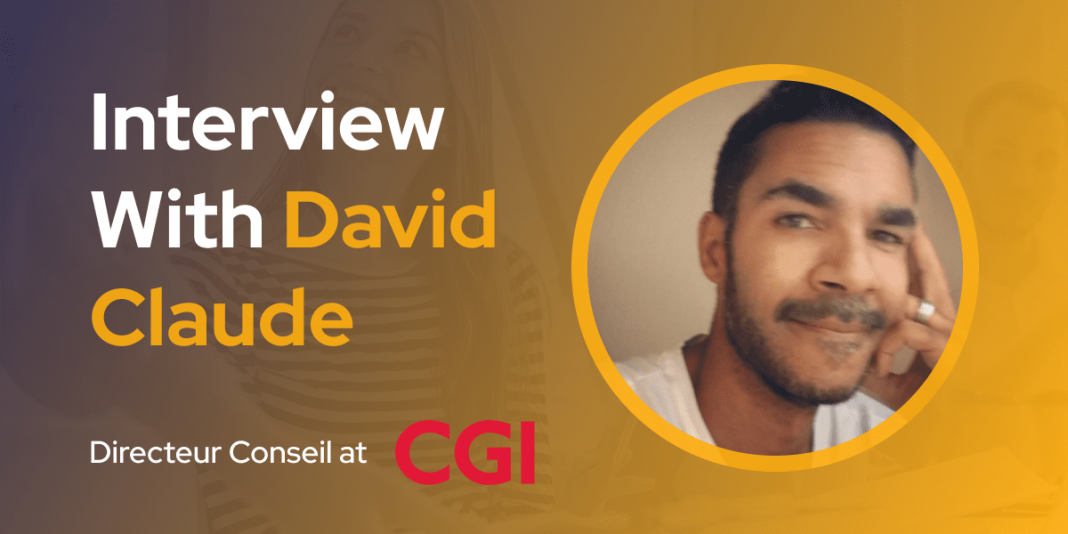Hi David, tell us about yourself and your background.
I’m quite the curious guy with an unquenchable thirst for knowledge and information. I must admit I like strategy more than production because I like to observe behaviors and understand personalities, analyze challenges and provide multiple pathways to solve them. I started my 25-year career path in the advertising world, first as a creative, moving on to strategy, then business development. And then I switched to UX. And then evolved to CX. My current role at CGI is UX/UI Director Expert, but I constantly end up using my CX toolset and know-how.
(As a side note, I find that the current difference between UX and CX is unnecessary. I’m a strong proponent of merging both fields into the same practice — and yes, there’s a lot of fun discussions to be had about this).
How did you first start working in the CX space?
Late in my career, I had some opportunities to work with clients whose challenges required working with a mixed toolset, which actually was a combination of my current expertise: marketing strategy, advertising, and user experience. Upon looking for some innovative strategies and methods, I stumbled on an article about CX, and that’s when I found out it was an actual role.
I quickly found the CX discipline to be the perfect opportunity to evolve my marketing and advertising savvy into the more current, digitally-borne practice of « experience as a service.» I also found that a lot of my prior knowledge and know-how were transferable, sometimes even preferable to some methods in the current practice. And then it mostly was about learning the ropes.
What are some of the common misunderstandings related to customer experience?
I find that some people tend to define “customer experience” as if it was something that can be created or designed. Design is about solving problems; customer experience is a reaction to how well we’ve performed. It’s also insight towards improving this performance.
Thus, companies shouldn’t hire a CX specialist for their ability to think creatively, out-of-the-box ideas; Rather, for their ability to understand and communicate customer insight with such clarity that any collaborator feels like they could have out-of-the-box ideas of their own.
Have you seen any interesting new trends in eCommerce this year?
Short answer, no. I’ve seen old trends increase exponentially, though. The pandemic forced people to manage their customer lives from home. Online purchases have increased, online food ordering has increased, entertainment media consumption has increased, family time has increased, along with the need to improve its quality, perhaps, to avoid boredom. eCommerce only became more important support to these ongoing trends.
eCommerce boomed in 2020, and consumers started leaving more product reviews online. How can we make the most out of this momentum?
We should embrace it and give it a space of its own by improving how we capture, manage and act upon the insights provided. The next big social media could be made of nothing but customer feedback and reviews. We could even make this a discipline in itself, creating some sort of a Product Review Analyst role. Broadcast it — Have product review reporters. And so forth. Reviews, feedback, comments — they’re all such drivers of behavior, such influencers of trust, that I can’t believe they’re not being more systemized and used to greater effect.
What are some CX companies/solutions you’re keeping your eyes on right now?
My own! CGI.
Increasingly we see clients come to us with their (oft newfound) excitement over the potential benefits of people-centric design. Or coming with challenges they didn’t know could be solved using a CX perspective. And because of the variety of industries we work with, we’re faced with an equal variety of challenges to solve. This forces us to constantly assess and improve the way we implement our CX practice, and that’s what’s inherently fun about it. CX is a living, breathing discipline that’s in constant evolution.
And solutions? Well, a few years ago, I had founded a startup called Warehood, whose objective was to create productive interactions between brick-and-mortar stores and roaming, mobile consumers. We had created a web and mobile marketplace that transformed a city’s neighborhoods into multiple “shopping mall” groups where users could share discoveries in said neighborhood’s feed. (Wink, wink, dear investors, we still own the code.)
I always found that this material world of retail lacked customer interaction and knowledge compared to its eCommerce sibling. The very notion of physical stores using digital tools to effect is still in its infancy. I would love to see more initiatives towards improving this ecosystem.
So many things changed in 2020. While some things are going to return to “normal,” what are new trends and habits you think will stay with us in the long term?
I don’t think that things “changed” that much in 2020. I think there was a lot of momentary adaptation, temporary ideas to bridge temporary problems. There was a lot of frustration, reclusiveness, but also a lot of resourcefulness and perhaps, some newfound acceptance for patience.
Social patience. Consumer patience. Business patience. A resignation to face the fact that things won’t go as fast as they did before and that we have to rely on our own resourcefulness and give it time. And giving something time, in a business or personal context, means making the evolution of this “something” matter more to us.
What will stay with us in the long term, I think, is the return of our appreciation for building gradual, lasting “relationships” with the entities around us, human or digital. Those ones we feel have the most value.
Do you believe focus groups are still relevant in the era of eCommerce? Why?
Asking people their opinion, in groups or individually, will always be relevant. And while that’s true for eCommerce, it’s also true for anything else we’d want to analyze from an experience perspective.
On one side, it’s useful to assess the level of “cultural gregariousness” that groups may express when talking about an experience, and on the other, it’s invaluable to capture the authenticity of anyone’s own individual emotions, beliefs, and observations.
Last but not least, what is your favorite CX metric?
I’d have to say it’s nothing like the traditional ones. The customer adoption rate is what I end up considering as my favorite one.






